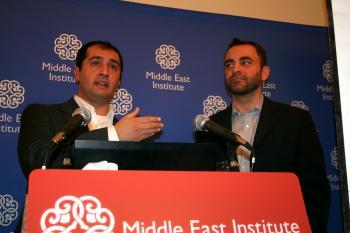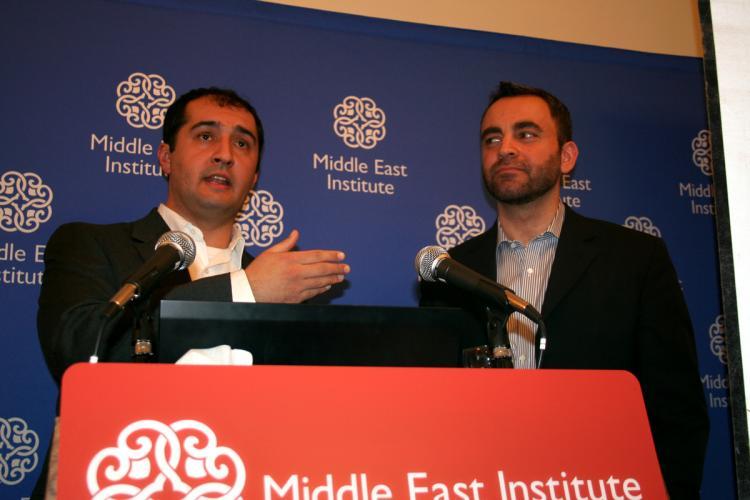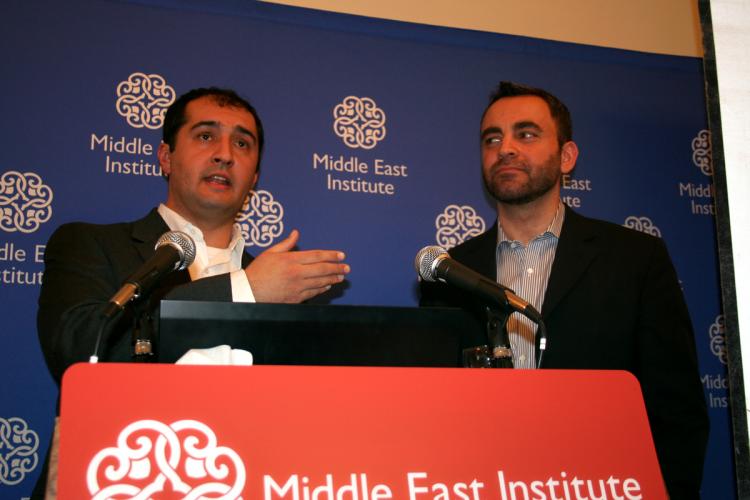WASHINGTON—On Feb. 11, Iran will celebrate the 31st anniversary of the Islamic revolution, which will afford an opportunity for the regime’s opposition, the Green Movement, to come out and demonstrate in large numbers. Since the disputed June 12, 2009 presidential election, both the pro-regime and opposition sides have been using various means of persuasion to try to dominate the other. Neither side is backing away.
Two Iranian scholars, Alex Vatanka and Ali Alfoneh, were invited Feb. 3 by the Middle East Institute (MEI) to give their interpretations on how this struggle will play out in the weeks ahead.
The situation as Iranians prepare for the Feb. 11 anniversary is quite tense. The regime has begun carrying out its first executions resulting from a mass trial held in August. Two men were hanged recently and nine more are slated for execution.
The loser in the presidential election, Mir Hossein Mousavi, has accused the regime of being “tyrannical,” resembling the Shah’s rule that the Islamic Republic overthrew in 1979. Instead of staying above the fray and trying to diffuse the tensions between the two sides, Supreme Leader Ayatollah Ali Khamenei has taken the side of the Admadinejad camp, calling the protesters “hooligans,” as thousands have been arrested and dozens killed by the Bajic militias.
Alex Vatanka is a scholar at the MEI, who specializes in the geopolitics of the Middle East. He is editor of the Jane’s Islamic Affairs Analyst and is a senior fellow in Middle East Studies at the U.S. Air Force Special Operations School.
Ali Alfoneh is a visiting research fellow at the American Enterprise Institute. He spent a year in Tehran at the Institute for Political and International Studies as an independent researcher. During this time Alfoneh acquired his expertise on the Islamic Revolutionary Guard Corps (IRGC).
Vatanka said it is important to understand that erosion of support has been a consistent feature of the Islamic Republic since 1979. The “reformers” versus “hardliners” is not something new. “Intra-regime rupture has always been present, but its current intensity [following the June 2009 election] is unprecedented.”
But this confrontation did not happen all of a sudden, according to Vantaka. The stage was set for the current crisis as early as the 2004 parliamentary elections when the Guardian Council disqualified two thirds of the candidates, most of which were “reformers.”
Vantanka laid special emphasis as an explanation for today’s crisis on the 2005 presidential election when the hardliners, the Admadinejad faction, “went after one individual,” the cleric-politician Akbar Hashemi Rafsanjani, who was president of Iran 1989-97.
“Going after Rafsanjani changed the equation and made the reformists opposition much greater than it used to be,” said Vantanka. By the 2009 election, the opposition had become “much more vocal and instinctively capable.” Meanwhile, conservatives and original supporters of the Islamic revolution, like Rafsanjani, found themselves being pushed into the opposition camp.
The BBC provided, June 9, 2009, another explanation for the unpopularity of the Khamenei rule, namely its undemocratic tendencies and human rights abuses: “In recent years, the hardliners have used the judicial system to undermine reforms by imprisoning reformist personalities and journalists and closing down reformist papers.”
“The rise of the Ahmadinejad faction since 2005 has meant one major camp is being forced out of the traditional compromise-making process,” said Vantanka. Vantanka quoted former presidential candidate and cleric, Mehdi Karroubi warning, “Hardliners should not jeopardize the Islamic Republic.”
The Ahmadinejad forces don’t physically attack or arrest someone like Rafsanjani or Mousavi. “Instead they go after Rafsanjani’s daughter,” said Vantanka. He could have added that they killed Mousavi’s nephew.
Supreme Leader Ayatollah Ali Khamenei aggravated the conflict when he downplayed the importance of the presidential election and the alleged fraud. The opposition seized on his position, regarding him as Iran’s new dictator, no different than the Shah whom the revolution of 1979 overthrew. Vantanka said that Khamenei sided with the hardliners, which paved the way for the political crisis. Khamenei is behaving unlike the first supreme leader, Ayatollah Ruhollah Khomeini, who did not take sides.
A senior cleric, Rafsanjani heads the Assembly of Experts, which could theoretically remove Khamenei. He has rebuked the latter for not showing more leadership and siding with “extremists.”
After the June 12 election, the protesters shifted their focus from anti-Ahmadinejad to anti-Khamenei, and called into question the constitution and having a “supreme leader.” While the senior opposition leaders are committed to the Islamic Republic and the constitution, “the youth in the streets want none of this. They want the entire regime to change but lack the means,” Vatanka said.
However, a new development since the Dec. 2009 protests has been a shift from “Khamenei has to go” to “Khamenei has to listen.” The opposition leaders are imploring the Supreme leader to change to a more neutral stance—“to step aside and let us deal with Ahdmadinejad within the framework of the Islamic Republic,” Vantanka said
The Revolutionary Guard
The most important pro-regime groups consist of the Supreme Leader Khamenei, the fundamentalist clergy, and the Iranian Revolutionary Guard Corps (IRGC) and its Basij militias. For the opposition, Vantaka placed great emphasis on the importance of the liberal clergy as a critical new component. In previous crises in 1994, 1999, 2001, and 2003, they had not played a significant role, but in 2009 it is different, he said.
Both scholars agree that the key to a resolution of the standoff between the state and the Green Movement lies with the IRGC, which has the constitutional function of protecting the regime, including perceived internal threats. Alfoneh spoke of the expanding political and economic role of the IRGC, which is not restricted to military functions. Thirteen of the 21 cabinet ministries are former officers of the IRGC, which is unprecedented, said Alfoneh. The supreme leader has actively supported their expanded political role.
But Khamenei may have in the process undermined his own influence. In an article in the Middle East Quarterly (Sep. 2008), Alfoneh anticipated that Khamenei may become “a prisoner of his own Praetorian Guard, paving the way for a military dictatorship.” At the MEI discussion, Alfoneh said it has already happened: “It is no longer a theocracy, it is a military dictatorship.”
Iran’s Unreliable Citizen Militias
Working under the command of the IRGC are the Basij militias, an Iranian volunteer paramilitary known for its extreme brutality. According to the Washington Post, Mousavi referred to them (without naming them) as persons using hoses, clubs, iron bars, truncheons, and occasionally firearms. Tasked to enforce Islamic morality, they are not terribly professional; sometimes they wear a uniform such as black shirts and pants and sometimes they wear street clothes. Originally the Basij were used to clear mine fields in the Iran/Iraq war.
The Basij were described by Alfoneh as functioning the same way as Hitler’s Youth in Nazi Germany, citizen militias in the Soviet Union or the Red Brigade in Communist China. However, the Basij cannot be reliably deployed as the militias above were. Many have friends and family on the other side and they are reluctant to “beat up their neighbors,” said Alfoneh. “The Basij in the neighborhoods has been a fiasco,” said Alfoneh. “Iranians are too decent to beat up neighbors.”
Similarly, as students or as workers in the labor force, the Basij are reluctant to beat up their fellow students or colleagues. “The Basij are dysfunctional because of the social fabric and structure of the Iranian society,” Alfoneh said. The police in the large cities have also shown some reluctance to defend the regime. Alfoneh said he counted nine times when the police in Tehran capitulated to the demonstrators and “did not perform orders of their superiors.”
This leaves the Revolutionary Guard to protect the regime. But IRGC has strong economic and political incentives today, unlike what it was when it was created in 1979. They are also conscious that “it is impossible to rule by force,” said Alfoneh. Whether the weakness of the Basij, or the economic interests of the IRGC, will lead to an accommodation with the opposition remains to be seen.
Two Iranian scholars, Alex Vatanka and Ali Alfoneh, were invited Feb. 3 by the Middle East Institute (MEI) to give their interpretations on how this struggle will play out in the weeks ahead.
The situation as Iranians prepare for the Feb. 11 anniversary is quite tense. The regime has begun carrying out its first executions resulting from a mass trial held in August. Two men were hanged recently and nine more are slated for execution.
The loser in the presidential election, Mir Hossein Mousavi, has accused the regime of being “tyrannical,” resembling the Shah’s rule that the Islamic Republic overthrew in 1979. Instead of staying above the fray and trying to diffuse the tensions between the two sides, Supreme Leader Ayatollah Ali Khamenei has taken the side of the Admadinejad camp, calling the protesters “hooligans,” as thousands have been arrested and dozens killed by the Bajic militias.
Alex Vatanka is a scholar at the MEI, who specializes in the geopolitics of the Middle East. He is editor of the Jane’s Islamic Affairs Analyst and is a senior fellow in Middle East Studies at the U.S. Air Force Special Operations School.
Ali Alfoneh is a visiting research fellow at the American Enterprise Institute. He spent a year in Tehran at the Institute for Political and International Studies as an independent researcher. During this time Alfoneh acquired his expertise on the Islamic Revolutionary Guard Corps (IRGC).
Hardliners vs. Reformers
Vatanka said it is important to understand that erosion of support has been a consistent feature of the Islamic Republic since 1979. The “reformers” versus “hardliners” is not something new. “Intra-regime rupture has always been present, but its current intensity [following the June 2009 election] is unprecedented.”
But this confrontation did not happen all of a sudden, according to Vantaka. The stage was set for the current crisis as early as the 2004 parliamentary elections when the Guardian Council disqualified two thirds of the candidates, most of which were “reformers.”
Vantanka laid special emphasis as an explanation for today’s crisis on the 2005 presidential election when the hardliners, the Admadinejad faction, “went after one individual,” the cleric-politician Akbar Hashemi Rafsanjani, who was president of Iran 1989-97.
“Going after Rafsanjani changed the equation and made the reformists opposition much greater than it used to be,” said Vantanka. By the 2009 election, the opposition had become “much more vocal and instinctively capable.” Meanwhile, conservatives and original supporters of the Islamic revolution, like Rafsanjani, found themselves being pushed into the opposition camp.
The BBC provided, June 9, 2009, another explanation for the unpopularity of the Khamenei rule, namely its undemocratic tendencies and human rights abuses: “In recent years, the hardliners have used the judicial system to undermine reforms by imprisoning reformist personalities and journalists and closing down reformist papers.”
Supreme Leader Takes One Side
“The rise of the Ahmadinejad faction since 2005 has meant one major camp is being forced out of the traditional compromise-making process,” said Vantanka. Vantanka quoted former presidential candidate and cleric, Mehdi Karroubi warning, “Hardliners should not jeopardize the Islamic Republic.”
The Ahmadinejad forces don’t physically attack or arrest someone like Rafsanjani or Mousavi. “Instead they go after Rafsanjani’s daughter,” said Vantanka. He could have added that they killed Mousavi’s nephew.
Supreme Leader Ayatollah Ali Khamenei aggravated the conflict when he downplayed the importance of the presidential election and the alleged fraud. The opposition seized on his position, regarding him as Iran’s new dictator, no different than the Shah whom the revolution of 1979 overthrew. Vantanka said that Khamenei sided with the hardliners, which paved the way for the political crisis. Khamenei is behaving unlike the first supreme leader, Ayatollah Ruhollah Khomeini, who did not take sides.
A senior cleric, Rafsanjani heads the Assembly of Experts, which could theoretically remove Khamenei. He has rebuked the latter for not showing more leadership and siding with “extremists.”
After the June 12 election, the protesters shifted their focus from anti-Ahmadinejad to anti-Khamenei, and called into question the constitution and having a “supreme leader.” While the senior opposition leaders are committed to the Islamic Republic and the constitution, “the youth in the streets want none of this. They want the entire regime to change but lack the means,” Vatanka said.
However, a new development since the Dec. 2009 protests has been a shift from “Khamenei has to go” to “Khamenei has to listen.” The opposition leaders are imploring the Supreme leader to change to a more neutral stance—“to step aside and let us deal with Ahdmadinejad within the framework of the Islamic Republic,” Vantanka said
The Revolutionary Guard
The most important pro-regime groups consist of the Supreme Leader Khamenei, the fundamentalist clergy, and the Iranian Revolutionary Guard Corps (IRGC) and its Basij militias. For the opposition, Vantaka placed great emphasis on the importance of the liberal clergy as a critical new component. In previous crises in 1994, 1999, 2001, and 2003, they had not played a significant role, but in 2009 it is different, he said. Both scholars agree that the key to a resolution of the standoff between the state and the Green Movement lies with the IRGC, which has the constitutional function of protecting the regime, including perceived internal threats. Alfoneh spoke of the expanding political and economic role of the IRGC, which is not restricted to military functions. Thirteen of the 21 cabinet ministries are former officers of the IRGC, which is unprecedented, said Alfoneh. The supreme leader has actively supported their expanded political role.
But Khamenei may have in the process undermined his own influence. In an article in the Middle East Quarterly (Sep. 2008), Alfoneh anticipated that Khamenei may become “a prisoner of his own Praetorian Guard, paving the way for a military dictatorship.” At the MEI discussion, Alfoneh said it has already happened: “It is no longer a theocracy, it is a military dictatorship.”
Iran’s Unreliable Citizen Militias
Working under the command of the IRGC are the Basij militias, an Iranian volunteer paramilitary known for its extreme brutality. According to the Washington Post, Mousavi referred to them (without naming them) as persons using hoses, clubs, iron bars, truncheons, and occasionally firearms. Tasked to enforce Islamic morality, they are not terribly professional; sometimes they wear a uniform such as black shirts and pants and sometimes they wear street clothes. Originally the Basij were used to clear mine fields in the Iran/Iraq war.
The Basij were described by Alfoneh as functioning the same way as Hitler’s Youth in Nazi Germany, citizen militias in the Soviet Union or the Red Brigade in Communist China. However, the Basij cannot be reliably deployed as the militias above were. Many have friends and family on the other side and they are reluctant to “beat up their neighbors,” said Alfoneh. “The Basij in the neighborhoods has been a fiasco,” said Alfoneh. “Iranians are too decent to beat up neighbors.”
Similarly, as students or as workers in the labor force, the Basij are reluctant to beat up their fellow students or colleagues. “The Basij are dysfunctional because of the social fabric and structure of the Iranian society,” Alfoneh said. The police in the large cities have also shown some reluctance to defend the regime. Alfoneh said he counted nine times when the police in Tehran capitulated to the demonstrators and “did not perform orders of their superiors.”
This leaves the Revolutionary Guard to protect the regime. But IRGC has strong economic and political incentives today, unlike what it was when it was created in 1979. They are also conscious that “it is impossible to rule by force,” said Alfoneh. Whether the weakness of the Basij, or the economic interests of the IRGC, will lead to an accommodation with the opposition remains to be seen.






